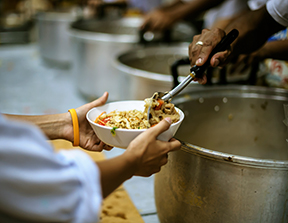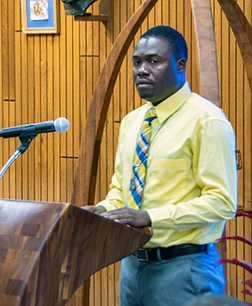Frt. Wisno Elie
Immigration Yesterday and Today
By Seminarian Wisno Elie, SVD
The story of Jesus feeding a multitude is considered one of the most significant events in the life of Jesus, as it is the only miracle of Jesus mentioned in all four Gospels. According to the Bible, the story began when Jesus and his disciples returned from their preaching and healing mission. The crowd gathered around Jesus was hungry, and as the disciples could not provide them with enough food, Jesus took five loaves of bread and two fish and fed the entire multitude.
The lesson that Jesus teaches us through this story is that, even with the little we have, we can make a significant difference in the lives of those in need. The story highlights the power of faith and the importance of sharing what we have with others. It also emphasizes the value of compassion and selflessness, essential qualities of the Christian faith. The story of Jesus feeding a multitude serves as a reminder of the boundless love and compassion that Jesus showed to all those around him, and it continues to inspire and uplift people of all faiths to this day.
Throughout human history, providing food to those in need has been an essential part of many cultures and religions. For instance, the Bible mentions the importance of feeding the hungry, and many communities have followed this practice for centuries. We can even witness this tradition at the time of the arrival of Christopher Columbus in the Americas in 1492.
When Columbus and his crew arrived in the New World, they were met by the native inhabitants of the land, who offered them food and hospitality. This act of kindness was not limited to Columbus and his crew; it was also extended to other European explorers and colonizers who came to the Americas in the following centuries. For example, the French and the English who settled in the Americas after 1600 were also welcomed and fed by the native Americans.

This tradition of hospitality and generosity continued even as more people from different parts of the world migrated to the United States of America. Some arrived voluntarily, seeking a better life and opportunities, while others were forced to leave their homelands due to persecution. Feeding the hungry is a biblical mandate and a universal human tradition across cultures and different historical periods. It is a testament to our shared humanity and innate desire to help others.
In the late 19th century our founder, St. Arnold Janssen, recognized the needs of German immigrants who had relocated to the United States. He realized that they required not only necessities like food and shelter but also spiritual guidance and the teachings of the Bible. As a result, he decided to send Brother Wendelin Meyer, SVD, to the U.S. in 1895 to spread the Good News of Christianity and to raise funds for missionary work. Brother Wendelin’s primary task was to sell Catholic German language magazines, which would provide much needed spiritual support to the German immigrants and help finance further missionary work. This initiative proved highly successful and contributed toward building a solid Catholic community in the U.S.
In a conversation last month, Deacon Roger Kyaw Thu, SVD, and I were discussing the continuous flow of migration across the world and in the United States. We took a particular interest in the situation of migrants in our city of Chicago. We were inspired by the work of many Divine Word Missionaries worldwide who support migrant communities. One such missionary in Australia caught our attention, and we were motivated to take action ourselves.
Together, we decided to pool our resources and organize a meal for the migrants in our city. Another confrere, Seminarian Betenora Bako, SVD, generously offered to participate, and the involvement of the Holy Spirit Life Learning Center, through Sr. Rosa Da Costa, SSpS, proved to be a great benefit, for the center provided us with blankets and gifts for the migrant children. Giving gifts to the migrant families who are looking for the future safety of their children reminded us of the story of the baby Jesus and his parents, who fled to Egypt to escape the persecution of King Herod. This journey was taken to ensure the safety of the child, who was seen as threatening the king's reign. The gifts we donated symbolized hope and solidarity as we strive to support and protect those who are vulnerable and in need.

This experience was fulfilling, and we wish we could do it more often. We hope we can prepare food not only for the migrants but also for people experiencing homelessness in our neighborhood. We could not offer them shelter, but we provided them with what we had, and it brought us joy to see them happy. We hope to continue to support these communities in the future.
Throughout history, immigration has been a complex issue around the world, and it is no different in the United States. The history of immigration in North America dates back to the 15th century, when Columbus arrived in America in search of goods, which might be considered a form of economic migration. In the 1600’s settlers from France and Great Britain came and stayed. This was also a form of immigration, as they settled in lands that did not originally belong to them.
Over the course of the 19th and 20th centuries, many other immigrants from various regions, such as Europe, Africa, Asia, South America, Central America, and the Caribbean, came to the United States to seek a better life or flee persecution in their home countries. However, each era of immigration has brought its own challenges and complexities that have had to be addressed. As immigrants continue to arrive in this country, we need to look closer at the current situation and find ways to help those who need it most. While prayer is a powerful tool that we can use, it is not enough to pray for the immigrant population; we must also take action to support and assist them in any way we can.
When Jesus saw a crowd of hungry people, he prayed to the Father to multiply the food and feed more than 5,000 people. We can follow his example and do the same with our resources. Together, we can make a difference and help those in need.
We'd Love to Hear From You
His mission is Our mission...Is it Yours? Let’s find out together!